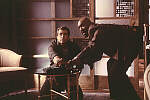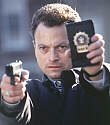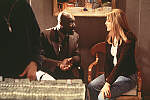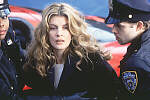|
||||||||||||
  Sign Guestbook View Guestbook |
||||||||||||
|
On Location With ĎRansomí Stars Los Angeles Times
He smiles conspiratorially as he gears up for the story.
"I started laughing, but I couldnít give it a good hearty laugh,
so I had to expel my mirth with another physical thing
entirely that came out as this wheezing."
He illustrates with a long, loud wailing sound.
"I felt like Harvey Keitel in Bad Lieutenant. I thought I
was going to burst something - I was begging them to stop.
They didnít care it hurt. They wanted to hear it again."
"We just kept shooting and working around Mel,"
says Howard, snacking on a corn muffin in an Upper West
Side diner between takes. "Now weíre doubling back and
plugging him into scenes we shot without him."
He is worried that trees, many of which have begun to
blossom with the onset of spring, will ruin the continuity
of those scenes. "Logistically, I canít say Iíve ever
had worse on a movie. It was a real reworking of the
whole schedule --- it was a jigsaw puzzle."
As Tom Mullen, Gibson plays an ultra-successful Trump-like
entrepreneur who goes on national television to negotiate the
riskiest deal of his life: turning US$ 2 million in ransom
money into a bounty on the heads of his sonís kidnappers.
It was Mullenís human shortcomings that appealed to Gibson.
"Tom really gets the guts ripped out of him," says Gibson,
who has six children of his own. "he has all the trappings of
high society. Heís got a nice apartment, a car, doughm but
heís not without blame. You donít ascend to a position like
that without at least misdemeanours along the way. Itís
interesting to see how meaningless it all is. You see these
characters --- he husband and the wife --- as itís all
stripped away from them."
The day Gibson returned to work a few weeks after surgery,
he was still to tender to do a big Madison Avenue showdown
scene with the kidnappers. Howard used a stunt man for a
portion of the scene and filmed Gibson doing non-strenuous
activity. The rest would be shot at a later date.
"I had to go pretty easy," says Gibson. "I
felt like something was going to burst out like that thing
out of John Hurtís shirt (in Alien). You feel like the
bottomís going to drop out of your stomach or something if
you even sneeze or cough."
After the all-American Apollo 13, Ransom is an important
departure for Howard. "I donít want to be typecast as a
director the way I think I probably was as an actor," he
says with a familiar squint and some less familiar lines in his face.
As a father of four, Howard says, he knows the real fears this
story plays on. "Often you just get behind a story and do the
best you can casting it, and move forward," he says. "In this
instance it was really important to know who was going to be
playing Tom --- because I guess I identified with that role.
I relate to the characterís high-visibility career, his ambition,
love of family and trying to find the middle ground there,
which is almost always impossible because at any given moment
something always seems out of balance."
According to co-producer Scott Rudin, Howard was slow to sign on
to the project. Nonetheless, he worked on the script with Rudin
and Richard Price (Clockers), who was hired to rewrite a script
by Alexander Ignon. "Ron was the unofficial guru to it while he
was finishing Apollo 13. We developed it without a commitment
from Ron, but the script kept getting better largely based on his
ideas."
Howard, who signed on only after Gibson committed to do the film,
took his cues from Hitchcock and In Cold Blood, on of his favourite
thrillers. "The movie isnít like Dog Day Afternoon, but thatís
a film I looked at a couple of times for its realism."
The look of the movie is as different as the subject matter for
Howard, who hired Polish director of photography Piotr Sobocinski
(Red) to create a noir-ish effect through the use of lighting and
contrast. Extensive use of a Steadicam gives an urgency and
flexibility of viewpoint to the story.
"Some of the decisions I made about how to shoot the movie ended
up being more complicated than I had imagined," Howard says of the
quick shifts of perspective between Gibson, Russo and the kidnappers,
a motley crew including Lili Taylor, Live Schreiber, Evan Handler
and former New Kid on the Block Donnie Wahlberg.
"I wanted to use camera movement to look at what happens
when you get these nightmare calls. What do you notice? What
do you become aware of --- from the husbandís and wifeís
perspectives? Iím trying to get that psychological side.
Itís not a movie you watch at armís length."
"In my research, I tried to find out what is the reality
of being a black man in the FBI," says Lindo, who recently
played opposite Russo in Get Shorty.
"As a black person in an organisation like this, and especially
being in charge of such a high-profile case, I think Iím someone
who really had to prove himself. Lo and behold, Richard (Price)
came back with a scene where I say something to Tom about what I
had to go through to be in this position. Itís small, but I really
appreciate it."
"Gary wasnít working for a few days and he sent me these,"
Howard says with a chuckle. The photos of Sinise, who played
Ken Mattingly in Apollo 13 and Lt Dan in Forrest Gump, reveal
a goofiness he didnít show in either of those roles. Under the
big toothy smiles in the photos, he has written "I miss you.
Love, Gary."
Howard cast Sinise in the pivotal role even though the script
originally called fr an older actor to play a retired police
officer. "In addition to being a tremendously versatile actor,
Garyís just getting going at his movie career so he doesnít
carry baggage one way or the other."
To prepare for the role, Sinise patrolled Bayonne, New Jersey, with
a police offiver for a night. "Their job is to look for bad guys
all night long, to find scum and deceit," says Sinise, relaxing
in his trailer between takes with Louis Prima blasting on the
stereo. He seems unconcerned with the fake blood that has caked
on his clothing from this morningís scene with the SWAT team.
Though they didnít find any bad guys that night, Sinise did find
some motivation for his character.
"Thereís a rush you get from danger. You have to get
off a little bit from jerking guys around or you wouldnít
do this job. Personally, Iíd rather play a cop in a movie
--- itís worth a lot more money; real cops donít get paid
that much to put (themselves) on the line every day."
Every afternoon around four, she provides appetisers for
everyone. "I donít know where she comes up with it," says
Howard, who sat next to Russo in several classes at Burroughs
High School in Burbank and met up a few years ago at their
20th reunion. "One day we had a tea party, sometimes she
makes little sandwiches if itís an especially tough day.
Reneís looking after us. I guess you could say sheís hosting
the movie."
Russo was amazed that Gibson continued to play even during
the most difficult emotional scenes. "Melís style is
interesting," Russo marvels. "I have to go into work on
the verge of the emotion Iím going to need. Mel comes in
with nothing. In between takes of on of the toughest
scenes, he was cracking jokes and I thought, ĎHow am I
going to get through this?í He told me, ĎRene, for years
I tortured myself. Then I realised Iíve got to come onto
the set an empty vessel. Just let it go. Empty yourself."
She found that Gibsonís technique allowed her to sustain
the emotion over the many takes Howard needed to get the
shot just right. "I donít know how it happened " the
emotion would just be there when I needed it."
The work was exhausting, says Russo, who as the mother of
2-and-a-half- year old Rose, could empathise with the agony
her character undergoes. But playing such an emotional
role was new for her. It was Howard who managed to get
a painfully realistic performance from her, she says.
All those years of acting paid off for Howard, who uses
his ability to emote as a key to his directing style.
"He has such an amazing spirit and heart," Russo says.
"And heís a storyteller. To get you in the right frame
of mind, heíd put you in place and create a scene for
you. But it wasnít the story, it was the emotion heíd
convey while telling it. He has such empathy, you can
see it in his eyes."
Howard canít help his easy nature and charm. Though heís
tried to leave Happy Days behind him, heíll never quite
escape it.
"Heís Richie Cunnigham all the way," Donnie Wahlberg says.
"And everybody loves Richie."
|
||||||||||||
|
maverick | braveheart | ransom | conspiracy theory | payback | the patriot | chicken run | gallery | links |
||||||||||||
| ||||||||||||||||| L A S T U P D A T E D : 1 8 A U G U S T 2 0 0 0 ||||||||||||||||| e m a i l : a d l e l u @ b i g f o o t . c o m ||||||||||||||||| | ||||||||||||




 M
el Gibson is letting loose ungodly squealing sounds
and cracking himself up. Sitting in his trailer in New
York on a spring afternoon wearing black jeans and a
plaid shirt, he is gesticulating madly with his hands,
widening his eyes for effect and doubling over in simulated
pain. He is describing how his laugh sounded following
his emergency appendectomy, which kept him off the set
of Ron Howardís newest movie, Ransom. His scenes in the
psychological thriller about a childís kidnapping were
postponed while he recuperated.
M
el Gibson is letting loose ungodly squealing sounds
and cracking himself up. Sitting in his trailer in New
York on a spring afternoon wearing black jeans and a
plaid shirt, he is gesticulating madly with his hands,
widening his eyes for effect and doubling over in simulated
pain. He is describing how his laugh sounded following
his emergency appendectomy, which kept him off the set
of Ron Howardís newest movie, Ransom. His scenes in the
psychological thriller about a childís kidnapping were
postponed while he recuperated.
 "Oh man, two days after the operation, I was sitting
with my two assistants - theyíre the worst practical
jokers in the world," says Gibson, looking so
well-groomed for his new role itís hard to believe
Braveheart ever happened.
"Oh man, two days after the operation, I was sitting
with my two assistants - theyíre the worst practical
jokers in the world," says Gibson, looking so
well-groomed for his new role itís hard to believe
Braveheart ever happened.
 Though the story may seem funny now, it wasnít so funny
when the big-budget production, starring Gary Sinise,
Rene Russo and Delroy Lindo, was held up for weeks
beginning mid-March without its star. The schedule was
further delayed by some of the worst blizzards in years.
As a result, the movieís release --- originally slated
for summer --- was moved to November.
Though the story may seem funny now, it wasnít so funny
when the big-budget production, starring Gary Sinise,
Rene Russo and Delroy Lindo, was held up for weeks
beginning mid-March without its star. The schedule was
further delayed by some of the worst blizzards in years.
As a result, the movieís release --- originally slated
for summer --- was moved to November.
 Despite the long hours, difficult material and the surgery,
Gibson says, the shoot has been easy compared to his gruelling
hours on Braveheart. "This experience is much lighter," says
Gibson, who put in 19-hour days on the Oscar-winning movie
he directed and starred in.
Despite the long hours, difficult material and the surgery,
Gibson says, the shoot has been easy compared to his gruelling
hours on Braveheart. "This experience is much lighter," says
Gibson, who put in 19-hour days on the Oscar-winning movie
he directed and starred in.
 Howard, as usual, looked on the bright side. "Fortunately
the characters undergo a real emotional journey in this film.
Mel looked kind of haggard the first days back, which was OK.
The make-up folks got a little help with that."
Howard, as usual, looked on the bright side. "Fortunately
the characters undergo a real emotional journey in this film.
Mel looked kind of haggard the first days back, which was OK.
The make-up folks got a little help with that."
 The changes to the script, which is a remake of an obscure 1956
Donna Reed movie, included developing the kidnappersí side of the
story, which was left out of the first draft entirely. The plot,
which is full of twists and turns, examines how such an event
affects everyone involved.
The changes to the script, which is a remake of an obscure 1956
Donna Reed movie, included developing the kidnappersí side of the
story, which was left out of the first draft entirely. The plot,
which is full of twists and turns, examines how such an event
affects everyone involved.
 Howard has not been afraid to incorporate the actorsí ideas
into the script. Lindo, who plays the FBI agent in charge of
the Mullen Case, created an entire history of his character.
Howard has not been afraid to incorporate the actorsí ideas
into the script. Lindo, who plays the FBI agent in charge of
the Mullen Case, created an entire history of his character.
 Sitting in his office on the Queens sound stage, Howard
explains that the heaviest of the movie hasnít affected
the mood on he set. Practical jokes abound --- mostly at
the hands of Gibson and Russo. But everyone on the set,
it seems, is a joker. Howard displays two Polaroids of his
Apollo 13 buddy Sinise, who in Ransom plays Jimmy Shaker, a
tough New York cop.
Sitting in his office on the Queens sound stage, Howard
explains that the heaviest of the movie hasnít affected
the mood on he set. Practical jokes abound --- mostly at
the hands of Gibson and Russo. But everyone on the set,
it seems, is a joker. Howard displays two Polaroids of his
Apollo 13 buddy Sinise, who in Ransom plays Jimmy Shaker, a
tough New York cop.
 Russo, who pairs up with Gibson for the first time since
1992ís Lethal Weapon 3, takes care of the almost entirely
male cast, including Nick Nolteís son, Brawley, who plays
her kidnapped son Sean.
Russo, who pairs up with Gibson for the first time since
1992ís Lethal Weapon 3, takes care of the almost entirely
male cast, including Nick Nolteís son, Brawley, who plays
her kidnapped son Sean.
 "Ronís style as a director is pretty heavy," she says.
"He pushed me and pushed me --- to a point where it was
aggravating. One day he pushed so hard I buried my head
in my hands and Mel came up behind me and said, ĎPay your
duesí," she mimics in an ominous, deep voice. "I thought,
ĎMy God, is Ron going to push me to melodrama?í But he
didnít. This piece needed the pure essence of pain and
fear. He got me to a very pure place."
"Ronís style as a director is pretty heavy," she says.
"He pushed me and pushed me --- to a point where it was
aggravating. One day he pushed so hard I buried my head
in my hands and Mel came up behind me and said, ĎPay your
duesí," she mimics in an ominous, deep voice. "I thought,
ĎMy God, is Ron going to push me to melodrama?í But he
didnít. This piece needed the pure essence of pain and
fear. He got me to a very pure place."